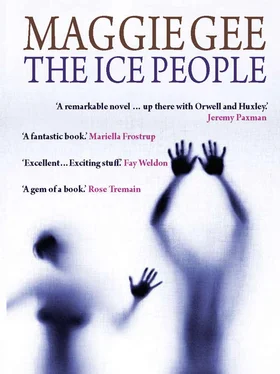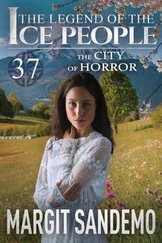Maggie Gee
The Ice People
For Richard Cohen
and for my beloved husband,
Nick Rankin
About five million years ago, our ancestors were arboreal, apelike creatures contentedly going about their business in the forests of East Africa. Then, for reasons that are still only partly understood, the Earth entered a series of recurring Ice Ages … typically a little over 100,000 years long … separated by interglacials about 15,000 years long. We live in an interglacial that began about 15,000 years ago … Even during a full Ice Age the forests of East Africa do not freeze …
John and Mary Gribbin, Watching the Weather
… during most of the last half million years the climate was … considerably colder than now … The term interglacial is used to describe major warm phases, each of which … lasted 10,000 to 15,000 years … We are now living within a major warm phase, which has so far lasted about 10,000 years (the warm-up began as early as 13,000 years ago.) It compares closely with previous interglacial periods … and … it seems likely that colder conditions will return …
Anthony J. Stuart, Life in the Ice Age
The great glaciers of the Ice Age will return … the four previous interglacials lasted between 8,000 and 12,000 years, and the present one, called the Holocene, has already endured a little longer than 10,000 years.
Windsor Chorlton, The Ice Ages
… the detail of the ice-core record has also revealed short-term periodicities [which] occurred very suddenly and may have been important in stressing populations … The Younger Dryas has now been recognised world-wide as a sudden reversion to glacial conditions following a generally milder phase of the Late Glacial. After a ‘false dawn’ of warmer conditions, the world was plunged once more into relative dryness and cold.
Andrew Sherratt, Climatic Cycles and Behavioural Revolutions
The Belgian botanist Genevieve Wollard examined the pollen in layers of peat that were deposited in what is now Alsace, in north-eastern France, some 112,000 years ago, in … the last interglacial epoch … Within the space of a mere twenty years, pollen from the temperate climate trees had vanished altogether. Just two decades had been sufficient to transform a balmy climate into one as frigid as Lapland.
Adrian Berry, The Next Five Hundred Years
Europe should prepare for temperatures to fall to Arctic levels, even though meteorologists have declared 1997 the Earth’s hottest year on record, an American scientist says. Wallace Broecker, of Columbia University, says … winter temperatures in northern Europe would fall by at least 10 °C within a decade. Britain would be as cold as Spitzbergen, 600 miles inside the Arctic Circle … the consequences would be devastating.
Nigel Hawkes and Nick Nuttall, reporting in The Times, 28 November 1997
The author would like to thank the Society of Authors for their support and Christine Casley for meticulous editing. Grateful thanks also to E. J. Scovell (Joy Elton), Barbara Goodwin, Roger Pemberton, Fatima Bellacosa, Caroline Winterburn, and Moris and Nina Farhi.
I, Saul, Teller of Tales, Keeper of Doves, Slayer of Wolves, shall tell the story of my times. Of the best of days, and the end of days. Of the new white world that has come upon us. For whoever will read it. For whoever can read.
I am sitting in the halfdark by the fire. A circle of eyes reflects the firelight. The wild children, surrounding me. Not a circle, really. Too regular. They crowd, and bulge outwards, and fight, and crow. Kit, and Jojo, and Fink, and Porker, and some who have roars and grunts for names …
They are eating something. That familiar smell. Delicious because all food is delicious, then fatty, sweetish, sickening.
They see I am writing. Their eyes flicker. Beyond them, it’s black to the horizon, where the afterglow of sunset is brighter than before. The unearthly radiance beyond is coming closer, like the deep new cold. A ring of fire from a ring of ice.
I’m an old man now — old for these times, over sixty. Not long ago, people lived more than twice as long, if they were rich and lucky enough not to be terminated. In the easy days, the long hot days when there were so many human beings …
I’m not afraid to die. This morning I saw it coming, or did I dream it? — the white bear with a cub beside it, lolloping, joyful, glassbright in the sunlight.
Why should I be afraid? I have lived through interesting times. I have been loved, by a woman and a child. I have seen the world change utterly, perhaps for ever. I have had a son, who is now a god. I have lived through great adventures. I have crossed the Pyrenees in deep snow, fought off the wolves side by side with my son; I rode across Spain on the waves of blossom, from north to south, from winter to spring. I have seen almond blossom, cherry blossom, orange blossom, whitening the blazing skies. Following the seasons down to the sea.
No, I’m not afraid to go. Yet I shiver a little when their eyes turn on me. Writing fascinates them, and makes them jealous. Sometimes they pretend to copy me. A few of them can do it, clumsily. Jojo can do it, and speak in sentences, he lived Inside till he was twelve. More of them can read, perhaps six, a dozen, though I doubt if they’ve ever read a book, they wouldn’t even know the word. They look at me expectantly, waiting for me to tell my story. They like stories about love and adventure, and my story’s full of love and adventure …
But how can they ever understand?
I shall tell this story for myself. And for Luke, perhaps, should he survive. If these packs of wolves let their gods survive.
For Sarah; yes, dead or alive.
I tell this story because I must.
— The wild boys dance between me and the fire, and the cold increases, suddenly. I am an ancestor, to them. Quite soon now they will — celebrate me.
But perhaps my story will keep me alive. Perhaps they will let me finish my story.
They want me to tell them about the future. I tell them I’d better stick to the past. Human beings have always foretold the future. Self-deluders. Wishful thinkers. I used to do it all the time, obscenely self-confident, a tech teacher … I told my pupils about global warming. I told them why we were so hot, why despite all our efforts it could only get hotter –
Well, as I say, let’s stick to the past. Let’s hear how the old world turned into this. Me and the wild boys shivering here in the shell of an abandoned airport. The fires that keep us warm are steadily burning their way through the airline’s abandoned fixtures. Old desks and partitions collapsing like foam, carpets unravelling in thick black fumes.
By day we don’t need them. By day we keep busy. If you’re not busy, these days, you die.
We share this airport with hundreds of Doves. Maybe no one in the future will know what they are.
Our mechanical friends. Our robot loves.
My Doves, my dears. How you once obsessed me. My love of machines drove poor Sarah wild. Once I thought their descendants would outnumber ours … and who knows? They might do, one day, in Euro. We know how many Doves escaped, and some of the escapees must have survived.
Mutating, as they were designed to do. Maybe the Doves will have the last laugh yet, out in this strange new frozen world. But I don’t think so. They … have their limits.
And here in the airport they don’t look good. They crouch in rows, looking dull and lifeless, so the wild boys grow bored with them, and I am too tired to maintain them all.
Читать дальше












